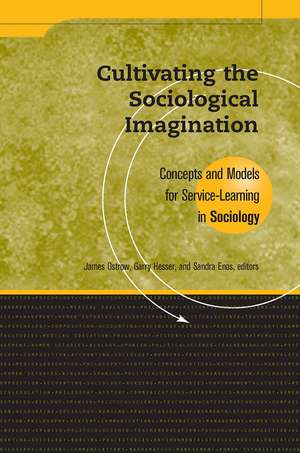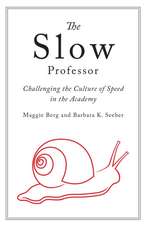Cultivating the Sociological Imagination: Concepts and Models for Service Learning in Sociology
Editat de James Ostrow, Sandra Enos, Garry Hesseren Limba Engleză Paperback – 1999
Preț: 292.77 lei
Nou
Puncte Express: 439
Preț estimativ în valută:
56.02€ • 58.38$ • 46.39£
56.02€ • 58.38$ • 46.39£
Carte disponibilă
Livrare economică 13-27 martie
Preluare comenzi: 021 569.72.76
Specificații
ISBN-13: 9781563770173
ISBN-10: 1563770172
Pagini: 244
Dimensiuni: 152 x 229 x 13 mm
Greutate: 0.3 kg
Ediția:1
Editura: Taylor & Francis
Colecția Routledge
Locul publicării:Oxford, United Kingdom
ISBN-10: 1563770172
Pagini: 244
Dimensiuni: 152 x 229 x 13 mm
Greutate: 0.3 kg
Ediția:1
Editura: Taylor & Francis
Colecția Routledge
Locul publicării:Oxford, United Kingdom
Public țintă
Postgraduate and Professional Practice & DevelopmentCuprins
About This Series—Edward Zlotkowski Preface—Service-Learning. Not Charity, But a Two-Way Street—Judith R. Blau Introduction—Service-Learning and the Teachability of Sociology—James Ostrow Part One. The Critical Examination of Social Life Sociology's Essential Role. Promoting Critical Analysis in Service-Learning—Sam Marullo Sociology and Service-Learning. A Critical Look—Kerry J. Strand Building Campus-Community Connections. Using Service-Learning in Sociology Courses—J. Richard Kendrick, Jr. Part Two. Pedagogical Advantages A Multicultural and Critical Perspective on Teaching Through Community. A Dialogue With Jose Calderon of Pitzer College—Sandra Enos Service-Research Projects in the Urban School. A Dialogue with Frank Furstenberg Jr. of the University of Pennsylvania—Sandra Enos Service-Learning as Symbolic Interaction—Barbara H. Vann The Joys of Your Troubles. Using Service and Reflection to Enhance Learning in the Community College Sociology Classroom—Martha Bergin and Susan McAleavey Service-Learning Through Meta-Reflection. Problems and Prospects of Praxis in Organizational Sociology—Hugh F. Lena Part Three. Action Research Action Research. The Highest Stage of Service-Learning?—Douglas V. Porpora Examining Communities and Urban Change. Service-Learning as Collaborative Research—Garry Hesser Afterword. Sociology, Service, and Learning, For a Stronger Discipline—Carla B. Howery Appendix. Bibliography. Sociology and Service-Learning—Garry Hesser Three Sample Syllabi Contributors to This Volume
Notă biografică
James Ostrow is director of academic affairs and associate professor of sociology at the Pennsylvania State University-Fayette. Prior to his appointment at Penn State, he served as director of the Bentley ServiceLearning Center and chair of behavioral sciences at Bentley College. He is the author of SociaI Sensitivity: A Study of Habit and Experience, and his research on educational practice and human experience explores the intersection of social theory, continental philosophy, and American pragmatist philosophy. Garry Hesser is professor of sociology at Augsburg College and the recipient of Campus Compact's 1998 Thomas Ehrlich Award for faculty achievement in service-learning. He is the past president of the National Society for Experiential Education and of the Higher Education Consortium for Urban Affairs. He is the author of Experiential Education as a. Liberating Art, and his current research focuses on service-learning as well as the area of housing and neighborhood revitalization. Sandra Enos is assistant professor of sociology and justice studies at Rhode Island College. She previously served as project director of the Integrating Service With Academic Study program at Campus Compact. She has published in the area of curricular options in service-learning.
Descriere
The editors and authors of this book, seventh in the Service-Learning in the Disciplines Series, bring their own sociological wisdom and imagination to demonstrate how service-learning can effectively be used in the sociology curricula and in class exercises.







